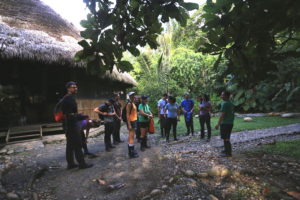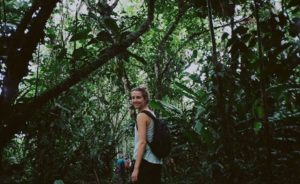During the November reading week, a group of ten students supervised by Prof. Teresa Kramarz (Director, Munk One) and Dr. Donald Kingsbury (Latin America Studies) travelled to Ecuador for a week of intensive field research. Since September, our team had been studying environmental politics through an analysis of the Yasuni-ITT initiative. Created in 2007, the initiative proposed a permanent suspension of oil extraction in certain areas of Ecuador’s Yasuni National Park in exchange for monetary compensation from the international community for the foregone oil export revenue. The proposal was novel: it presented a new model for environmental preservation and the beginning of a shift away from an extractive industry-based economy. The initiative eventually broke down in international negotiations in 2013. For us as researchers, it raised fascinating questions about the conditions that initially led to the unique proposal, and more importantly, the reasons for its eventual failure.
The fieldwork proved to be more rewarding than we could have imagined. Indigenous leaders, journalists, academics, government officials, and representatives from the oil industry (among other stakeholders) had strong and sometimes wildly different opinions on the initiative. For example, what some saw as a genuinely exciting innovation in environmental policy, others saw as an initiative destined for failure from the outset due to lack of government commitment. Coming to understand the reasons for these different experiences, we found ourselves marvelling not only at the complexities of the issues we were exploring, but also at the importance of having this on-the-ground experience. The insights from those who understood the intricacies of the local context, and had unique vantage points based on their experience with the initiative, were an invaluable learning opportunity.
We spent several days on site visits in the Amazon followed by extensive formal interviews in Quito, the capital of Ecuador. Standing at the site of an old oil spill, speaking with local people who were directly affected by it, and seeing oil pipelines running through the middle of previously pristine rainforest added a different dimension and understanding to the research that would be impossible to gain from readings alone. Witnessing the real impacts of the oil industry made our research more meaningful: it is not just a faraway or historical problem, but a real issue that is affecting real people every day.

The group learning about the local people, cultures, and biodiversity before setting off for a hike in the Amazon. (Credit Stephanie Xu)
Perhaps my biggest take-away from the fieldwork experience was the importance and value of being adaptable while in the field. It quickly became apparent how much was to be gained from keeping an open mind to the possibilities that result from unexpected events. An unfortunate delay and missed connecting flight meant we had to make last minute adjustments to our research plan. However, this resulted in an unanticipated opportunity to travel to a different region of the Amazon, where our experiences raised new and important questions related to alternative development models (such as ecotourism). Had we not travelled to this region, we may not have given thought to such questions.
My experience as a former Munk One student (2015-2016 cohort) really helped shape my approach to this research trip. As the program teaches and provides ample opportunities to practice the research process, I was confident with these skills prior to travelling to Ecuador, which was highly beneficial. Importantly, the program also encourages collaboration with an interdisciplinary group of peers (much like the diverse team we had in Ecuador). Having previously experienced this in Munk One meant that I knew how beneficial and exciting such collaboration efforts are, and how much they allow for thinking “outside the box.”
The fieldwork experience allowed our team to develop a much deeper understanding of the Yasuni-ITT initiative. Even more notably, it fostered new ways of thinking that will shape our approach to future research projects and, more broadly, the way we view the world. I am incredibly grateful to the University of Toronto and the Munk School of Global Affairs for creating student research opportunities in projects such as this.
